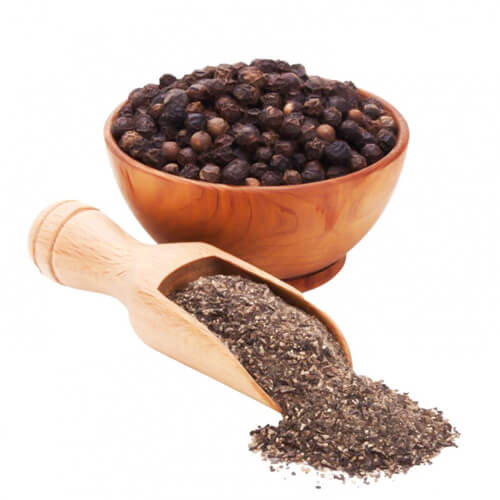Black Pepper: Piper nigrum

Black pepper (Piper nigrum) is a flowering vine in the family Piperaceae, cultivated for its fruit, known as a peppercorn, which is usually dried and used as a spice and seasoning. When fresh and fully mature, the fruit is about 5 mm (0.20 in) in diameter, dark red, and contains a single seed, like all drupes. Peppercorns and the ground pepper derived from them may be described simply as pepper, or more precisely as black pepper (cooked and dried unripe fruit), green pepper (dried unripe fruit), or white pepper (ripe fruit seeds.
Black pepper is native to present-day Kerala a state on the south western coast of India, and is extensively cultivated there and in other tropical regions.
Ground, dried, and cooked peppercorns have been used since antiquity, both for flavour and as a traditional medicine. Black pepper is the world's most traded spice, and is one of the most common spices added to cuisines around the world. Its spiciness is due to the chemical compound piperine, which is a different kind of spicy from the capsaicin characteristic of chili peppers
Health Benefits
-
A versatile spice: Black pepper has become a kitchen staple in households worldwide.With its subtle heat and bold flavor, it’s versatile and can enhance almost any savory dish.A dash of ground black pepper can be a tasty seasoning for cooked vegetables, pasta dishes, meat, fish, poultry, and many more.It also pairs well with other healthful seasonings, including turmeric, cardamom, cumin, garlic, and lemon zest.
-
A Powerful Antioxidant Several studies show that black pepper acts as an antioxidant in your body. Antioxidants are compounds that fight cellular damage caused by unstable molecules called free radicals. Free radicals form as a result of poor diet, sun exposure, smoking, pollutants, and more. Along with piperine, black pepper contains other anti-inflammatory compounds - including the essential oils limonene and beta-caryophyllene - that may protect against inflammation, cellular damage, and disease
-
Boosts Nutrient Absorption: Black pepper can enhance the absorption and function of certain nutrients and beneficial compounds. In particular, it may improve the absorption of Curcumin , an active ingredient in the popular anti-inflammatory spice turmeric. Research also shows that black pepper may improve the absorption of beta-carotene - a compound found in vegetables and fruits that your body converts to vitamin A
-
May Promote Digestion and Prevent Diarrhea: Black pepper may promote proper stomach function. Specifically, consuming black pepper may stimulate the release of enzymes in your pancreas and intestines that help digest fat and carbs.
